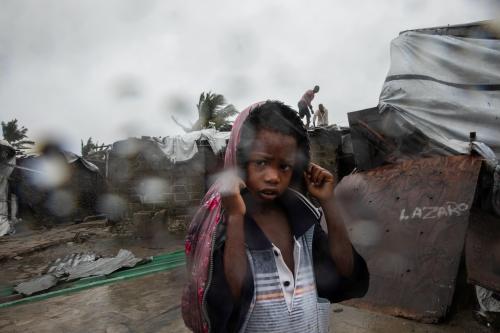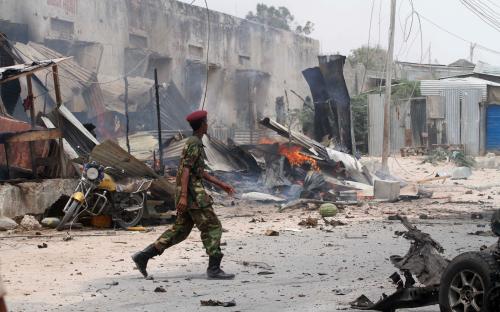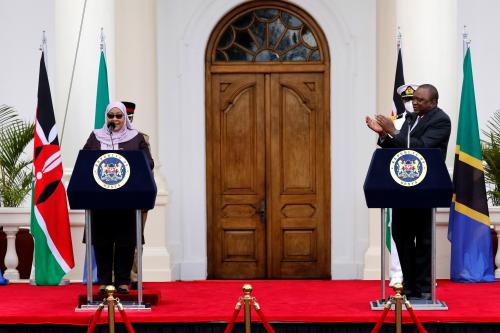U.N. Secretary-General António Guterres visits Somalia and Kenya while South Sudan increases NGO fees 100-fold
This week, United Nations Secretary-General António Guterres visited East Africa, his first trip to the continent since taking office in January. Mogadishu was the first stop on the trip, where he met with Somalia’s recently elected President Mohamed Abdullahi Mohamed. During the visit, the U.N. chief appealed for the sum of $825 million in order help alleviate the country’s humanitarian crisis—a combination of conflict, drought, climate change, and diseases such as cholera. In addition, during the meeting, the Somali president urged United States President Donald Trump to lift the travel ban on Somali immigrants.
The visit to Somalia was followed by a trip to Nairobi, where a joint press conference with Guterres and President Uhuru Kenyatta took place. The leaders largely discussed the humanitarian situation in South Sudan. The secretary-general reassured the public that, despite the continuing fighting in South Sudan, the risk of genocide has “considerably diminished.” He also warned that the violence and looting is blocking aid from reaching those in need; consequently, more than 1 million people are presently at risk. During the press conference, the closure of the Dabaab refugee camp in Kenya was also discussed. Kenyatta stated that the camp would have to be closed for good, as it no longer serves its original purpose of providing temporary shelter and has now become a permanent home.
In related news, this week, South Sudan increased the fee for work permits allocated to professional or business workers—a category under which foreign aid workers fall—to $10,000 from $100. The work permit fees for “blue collar” and “casual workers” increased to $2000 and $1000, respectively. This fee hike also comes amid a state of famine in the East African country. In a joint statement by the ministries of labor, interior, and finance, the government stated that the hike was in place to generate additional revenues to fill the budget gap for fiscal year 2016-2017 as well as encourage the hiring of locals. The fee increase would make it extremely difficult for nongovernmental organizations to allocate staff to South Sudan, as over 90 percent of foreign workers in the country are humanitarian workers. This is not the first time South Sudan has clashed with aid workers: In 2014, the government banned all foreign workers.
King Letsie III of Lesotho dissolves parliament after no-confidence vote
On Tuesday, March 7, King Letsie III of Lesotho dissolved the country’s parliament in response to a March 1 vote of no confidence in Prime Minister Pakalitha Mosisili. Lesotho’s political turmoil has been boiling over in recent years. Since 2015, Mosisili has headed a coalition government in the aftermath of the 2014 failed coup attempt that forced then-Prime Minister Thomas Thabane to flee to South Africa. Thabane has recently returned to Lesotho.
Cracks within the coalition government have deepened since the major party the Alliance of Democrats left the coalition last year. Now, tension is mounting as Mosisili (of the Democratic Congress) refused to step aside in favor of Monyane Moleleki (of the Alliance of Democrats) to take the role. Instead, the country is following the other constitutional option in which the king dissolves parliament and calls for elections, which will likely be held in three months. Thabane, of the All Basotho Convention, an opposition party to the coalition, stated that his party is ready to contest the upcoming elections, but that the dissolution of parliament is “unfortunate and could have been avoided if there was no desire to rearrange parliament through a vote,” citing the country’s unreadiness for and unnecessary expense of the elections.
Somalia plans to print national currency for first time in over 25 years
The Central Bank of Somalia, supported by the International Monetary Fund and the World Bank, is preparing to print new Somali shilling banknotes in 2017 for the first time since the 1991 start of the country’s civil war. Following the onset of the conflict and collapse of state institutions, Somalia’s official currency became increasingly marginalized within the economy, as warlords, businesspeople, and separatist regions imported or printed alternative and counterfeit currencies, which eroded trust in the national banknotes. The U.S. dollar then became a popular, trustworthy alternative to shillings in the 1990s and 2000s. According to Somalia’s central bank, Somalis conduct most medium- and large-scale transactions using U.S. dollars while smaller transactions often still involve the Somali shilling—although an estimated 98 percent of shillings in circulation today are fake according to an IMF representative in Somalia, Samba Thiam. Mobile money transactions (done in U.S. dollars) are also gaining traction in Somalia, as the World Bank’s 2014 Global Findex report notes that 37 percent of people (15 years or older) have mobile money accounts, compared to just 8 percent with bank accounts at traditional financial institutions.
The IMF’s mission chief in Somalia, Mohamad Elhage, has stated that the currency will be printed in 1,000 shilling notes, equivalent to approximately 5 U.S. cents, starting this year. However, several steps—including assembling a financial aid package to fund the printing program and holding consultations and trainings with banks and policymakers—need to take place before the printing will proceed.







Commentary
Africa in the news: Guterres visits East Africa while South Sudan increases NGO fees, Lesotho parliament dissolved, Somalia to print new banknotes
March 10, 2017